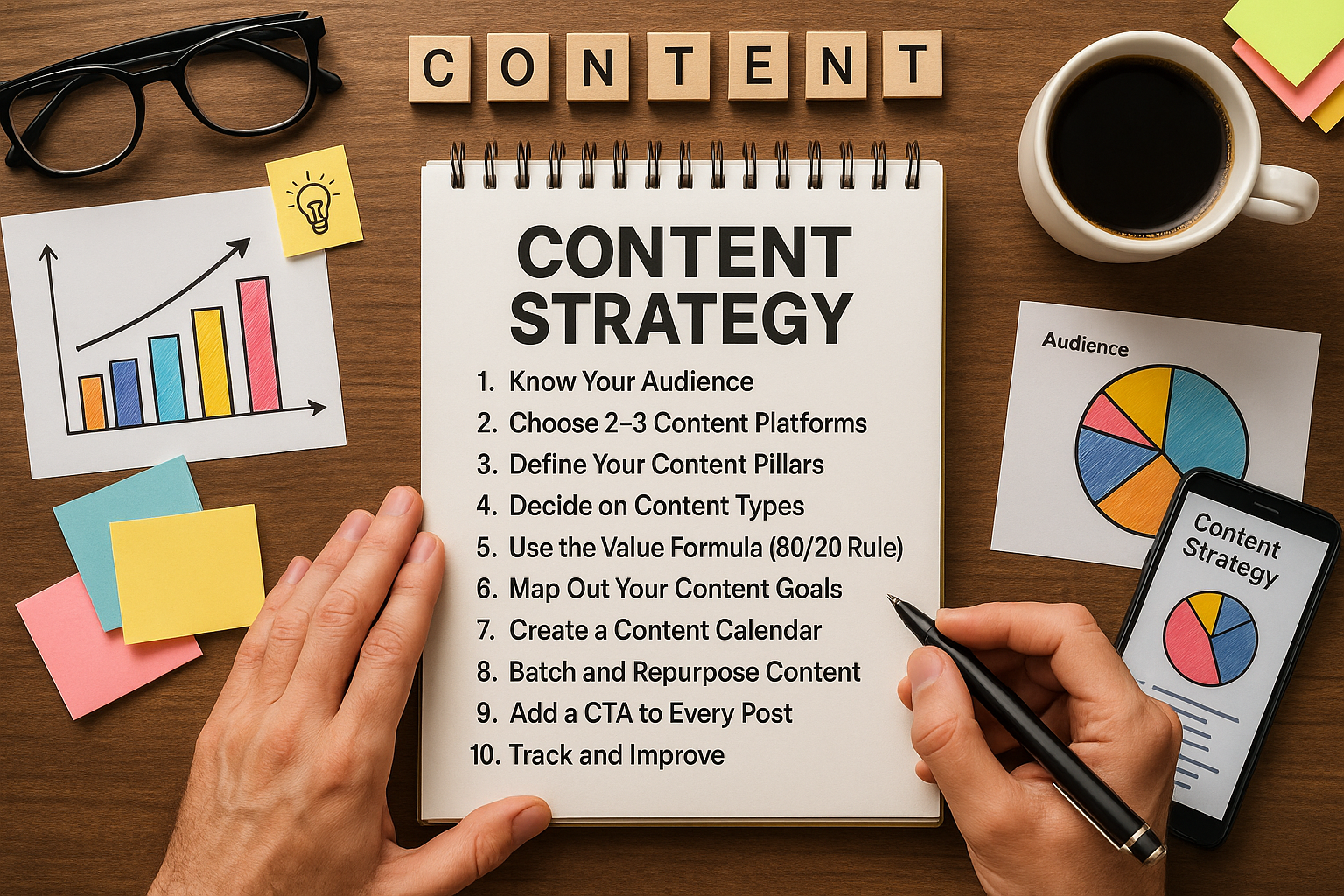Content is one of the most powerful tools for growing a business. Whether you’re a freelancer, coach, service provider, or small brand—content helps you build trust, attract leads, and make consistent sales.
But posting randomly doesn’t work. That’s why you need a content strategy: a simple plan that helps you create content with purpose.
This article will show you how to build a content strategy that works—even if you’re just getting started and don’t have a big audience.
What Is a Content Strategy?
A content strategy is a plan for:
- What kind of content you’ll create
- Who you’re creating it for
- Where you’ll post it
- Why you’re posting it
- How you’ll turn views into sales
Instead of posting “just to stay active,” you’ll post content that builds trust and authority while leading people to your offer.
Step 1: Know Your Audience
All good content starts with knowing who you’re speaking to.
Define:
- Their age or stage of business/life
- Their biggest challenges
- Their goals or dreams
- What they’re searching for
- Where they hang out online
Example audience:
“Coaches and service providers in their first 2 years of business who are struggling to get consistent clients.”
Step 2: Choose 2–3 Content Platforms
Don’t try to be everywhere. Focus on where your audience is and where you enjoy creating.
Good beginner combos:
- Instagram + Email
- YouTube + Pinterest
- LinkedIn + Blog
- TikTok + Newsletter
Tip: Master one platform first before adding another.
Step 3: Define Your Content Pillars
Content pillars are main topics you’ll post about regularly. Choose 3–5 that align with your business.
Examples:
- Education/tips
- Personal story or journey
- Behind the scenes
- Client results or testimonials
- Common myths or mistakes
This gives your content variety—but still makes it recognizable and relevant.
Step 4: Decide on Content Types
What formats will you use?
Some options:
- Reels or TikToks
- Carousels
- Stories or Lives
- Blog posts
- Emails
- Infographics
- Webinars or workshops
- Podcasts
Start with what feels easiest and build from there.
Step 5: Use the Value Formula (80/20 Rule)
Your content should be:
- 80% value: tips, stories, engagement, education
- 20% promotion: your offer, services, products
If all you do is promote, people tune out. But if you never promote, people forget you have something to sell.
Step 6: Map Out Your Content Goals
What do you want your content to achieve?
Examples:
- Grow your audience
- Build your email list
- Book discovery calls
- Sell a new product
- Fill your waitlist
Tie each content type to a specific goal.
Step 7: Create a Content Calendar
You don’t need anything fancy. Use:
- Google Sheets
- Notion
- Trello
- ClickUp
- Paper planner
Plan 1–2 weeks ahead. Include:
- What type of content it is
- The platform it’s for
- The caption or topic
- The CTA (what you want people to do)
Step 8: Batch and Repurpose Content
Batching = creating content in focused blocks of time.
Example:
- Monday: Write 3 captions
- Tuesday: Record 2 reels
- Wednesday: Design carousels
- Friday: Schedule everything
Repurposing saves time. Turn a blog post into:
- 3 Instagram posts
- 1 carousel
- 1 email
- 1 LinkedIn story
- 1 YouTube short
One idea = many pieces.
Step 9: Add a CTA to Every Post
A CTA (call to action) tells people what to do next.
Examples:
- “DM me the word START for details”
- “Comment YES if this helped”
- “Click the link in bio to download the free guide”
- “Tag a friend who needs this”
Never assume people know what to do next—guide them.
Step 10: Track and Improve
Pay attention to:
- Which posts get the most engagement
- Which CTAs lead to action
- What days/times work best
- What leads to sales or signups
Use this data to adjust and grow.
Tools like:
- Instagram Insights
- YouTube Analytics
- Google Analytics
- Email open and click rates
Final Thoughts: Show Up with a Plan
You don’t need to go viral. You just need to be consistent, helpful, and intentional.
A content strategy helps you stop guessing and start growing.
Start with one platform, one goal, and one week of planned content. Your audience—and your sales—will follow.
